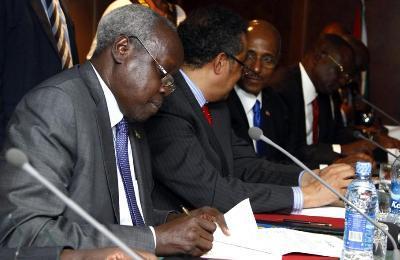South Sudan’s rival parties sign security arrangements
By Tesfa-Alem Tekle
October 26, 2015 (ADDIS ABABA) – South Sudan’s opposition faction of the Sudan People’s Liberation Movement (SPLM-IO), under the leadership of first vice president designate, Riek Machar, on Monday signed minutes of the permanent ceasefire and transitional security arrangement with reservations.

Earlier, in September, the opposition group refused to sign the same minutes, saying the document was not initially shared among the parties for deliberations and adoption before the government and former detainees could sign it.
The document was a recording of the suggestions from the parties on their respective proposals. Government demanded that it will deploy 5,000 troops in the capital, but the opposition said the proposal was against the spirit of the demilitarization of Juba as stipulated in the peace agreement signed in August.
After a clarification from the IGAD mediation on the need to further discuss the sizes and composition of the joint forces, the opposition group decided to sign the document.
On Monday, deputy chief of general staff for operations, Lt. General James Koang Chol signed the minutes representing his party in front of his counterpart from the government, General Malik Rueben Riak, chief negotiators of the three main signatories of the peace deal and IGAD Special Envoys.
The agreement was signed following the latest five-day military workshop held in the Ethiopian capital, Addis Ababa, aimed for the two rival parties to reach a common ground on demilitarizing and deployment of joint forces in the capital, Juba, and other key towns.
Although the armed opposition group signed the minutes to show its commitment for implementation of the final peace accord signed in August, it has however expressed reservations with regard to the troops that would remain in Juba.
Spokesperson of the SPLM-IO, Colonel William Gatjiath Deng said his group signed the minutes to show its commitment to the implementation of the agreement on the understanding that its reservations will be addressed through further discussion.
But both sides have agreed to deploy 3000 integrated police force whose number would be shared equally between the two parties, 1,500 each. The parties also declared positions of their forces to IGAD, but wanted the revelations to remain confidential with the mediation.
Officials of the opposition group said they will submit a harmonizing document for further discussion.
Chief negotiator of the SPLM-IO, Taban Deng Gai, said the signing is a significant step as it builds trust between the parties to the South Sudan peace agreement.
He hoped a high profile advance team of his party would go to Juba in between one and two weeks’ time.
Acting Chief negotiator of the South Sudan government, Michael Makuei Lueth, on his part said the signing is crucial as the permanent ceasefire and transitional security is the cornerstone of the agreement signed in August.
Chief mediator of the South Sudan peace process, Ambassador Seyoum Mesfin congratulated the SPLM-IO for taking wise and bold decision to sign the minutes and move the process forward.
Negotiations on the details of the sizes and composition of the rival forces will now continue until the parties agree.
(ST)
